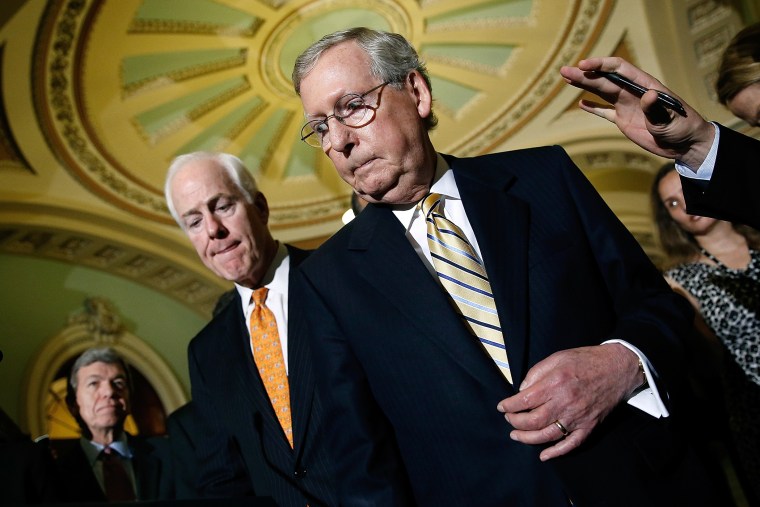Listening to Democrats, you'd think Republicans were promising nothing short of a fiscal apocalypse.
"This morning, Mitch McConnell revealed that if Republicans take the Senate, he'll force President Obama to bend to his will by shutting down the government -- AGAIN!" the Democratic Senate Campaign Committee wrote in a fundraising email last month. "Join the DSCC in calling out the GOP for their promise for more shutdown wars if they take control of the Senate!" another message read.
Republicans insist that Democrats are simply creating a boogeyman to gin up their base—and fill their campaign coffers—in an election year.
The real reason the specter of another shutdown has returned is because the country is being run by a polarized, deadlocked government whose divisions could become even deeper after the midterms if Republicans take control of both houses of Congress, resulting in more potential standoffs with the White House.
Last year's government shutdown happened because House Republicans refused to pass a budget without dismantling Obamacare, which neither the White House nor Congressional Democratic leaders would accept. If Republicans win control of the Senate as well, they promise more confrontations with the White House to push back on hot-button issues. Senate Minority Leader Mitch McConnell made this explicit in an August 20 interview with Politico, explaining that Republicans would try to attach riders and other restrictions to spending bills to check President Obama's power if they captured the Senate majority in November .
“We’re going to pass spending bills, and they’re going to have a lot of restrictions on the activities of the bureaucracy,” McConnell told Politico. The president “needs to be challenged, and the best way to do that is through the funding process,” he added, offering environmental regulations as one example. “He would have to make a decision on a given bill, whether there’s more in it that he likes than dislikes.”
In other words, under a GOP-controlled Congress, Obama will have to choose whether to accept the Republicans' bills to fund the government with certain conditions attached, or whether to veto them, according to McConnell. If it's close to a budget deadline, that could mean a reprisal of the fiscal brinksmanship that led to a government shutdown in the fall of 2013. McConnell doesn't say so outright, but he doesn't need to. As The New Republic's Brian Beutler explains, "he’s threatening to use the appropriations process as leverage to extract concessions. That's a government shutdown fight."
There's also speculation that fiscal brinksmanship might come even sooner, though it's a significantly more distant possibility—and a politically risky one for Republicans.
While Congress agreed to a two-year funding agreement last December, in the wake of the last government shutdown. But that only sets the overall levels of funding: Congress either needs to pass the individual appropriations bills to set funds for specific activities and programs, or else pass a broad budget resolution doing so, to keep the government open. The next budget deadline is September 30, less than a month away. Republicans are expected to push for a short-term Continuing Resolution (CR) to keep the budget status quo until mid-December, at the end of the lame-duck session. That's left some worried that another round of fiscal brinksmanship could come sooner as Congress is forced to tackle the next round of budget deadlines.
Sen. Marco Rubio, for one, floated the possibility of using the budget resolution as a way to push back against Obama's potential executive action on immigration. "There will have to be some sort of a budget vote or a continuing resolution vote, so I assume there will be some sort of a vote on this," Rubio said in an interview with Breitbart last week. "I'm interested to see what kinds of ideas my colleagues have about using funding mechanisms to address this issue."
The White House has since pushed back against speculation that sweeping execution action on immigration is imminent, so that takes that potential catalyst off the table. Some conservatives are also urging Republicans to throw everything into a fight over the reauthorization of the Export-Import Bank, which has become a rallying cry for conservative activists and also expires on Sept. 30.
But on the Hill, few are gunning for such a fight just weeks before the midterm elections, and Republicans are in fact tamping down the speculation that a shutdown is imminent. While Republicans may be eager to provide their conservative bonafides, another shutdown threat isn't likely to win them public accolades, as more Americans blamed them than Democrats for last year's fight.
That said, relative peace over the budget this fall doesn't preclude more fiscal brinksmanship next year if Republicans take full control of Congress—and then decide to use funding bills as leverage to pressure Obama's White House.
